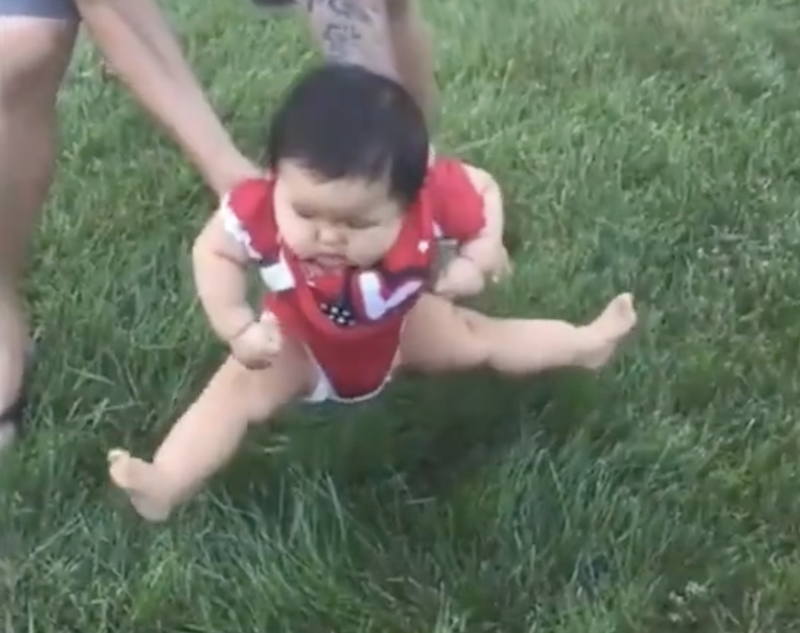Whether it’s a dirty diaper or too loud of a noise – babies can get cranky at the drop of a hat. If you are a new parent, then assuredly, you will get to learn new things every day about that little bundle of joy! So, here’s another addition to that never-ending learning list!! Do you know that babies avoid grass as much as possible? Also, there’s a certain way in which you need to acclimatize the baby to the grass? This article will give you an idea about why do babies avoid grass, and how to deal with grass allergies if your baby gets it. Apart from that, you will also get an idea about the right time you can put your baby on the grass.
Before you read this article, it is important to note that – the way each baby reacts to anything new is different. Though it has been generally found that babies avoid grass or any such prickly things in the initial years, however, there may be certain exceptions as well. Let’s uncover the specifics –
Table of Contents
Why do babies avoid grass initially?
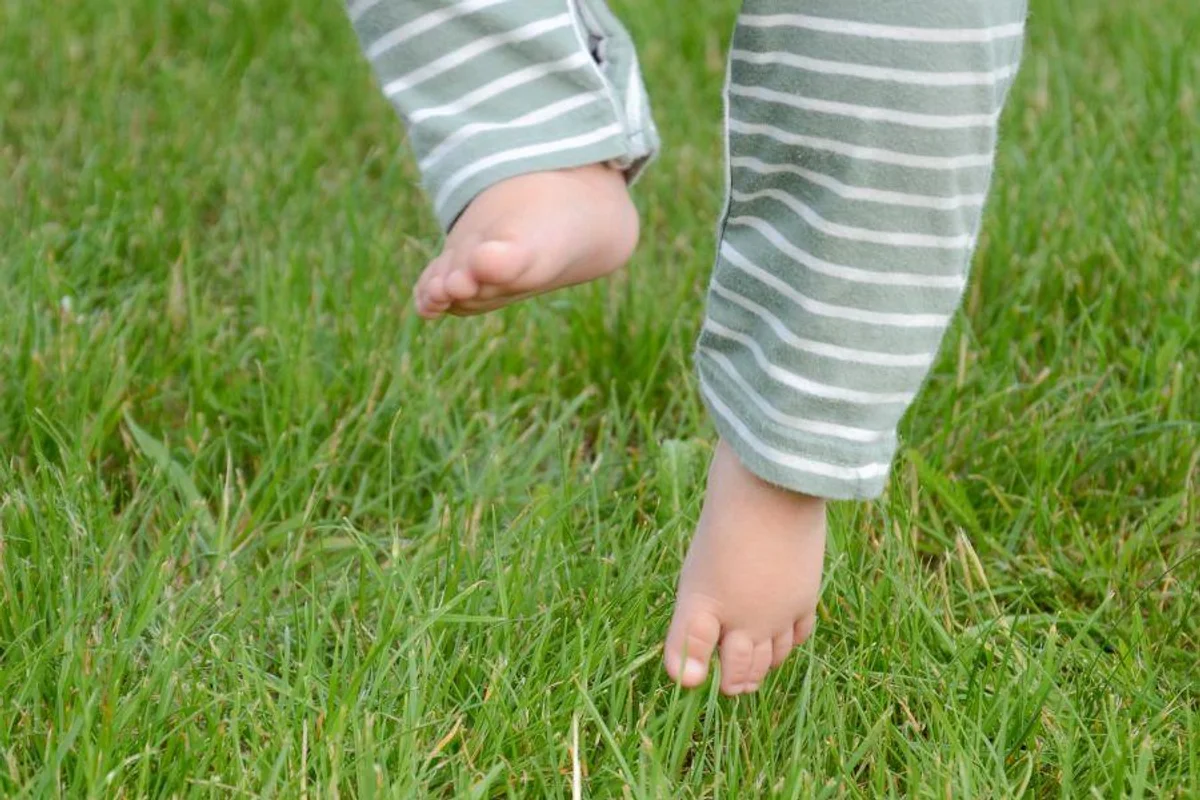
In case you are a new parent, and you have put down your baby to play on the grass, you will see for yourself how the little one almost instinctively contorts their body to avoid the grassy surface. You may think that it is simply some prickly blades that’s hitting the child, and that’s why the reaction. However, the truth is a little far from that.
The babies are terrified of the grass because the prickly and complex texture of the grass causes a sensory overload in their preliminary nervous system. For the uninformed – there are certain points you must know about sensory overload. The environment that the baby is exposed to is essential in developing the tactile senses of the baby. It needs some time to understand its surroundings and respond accordingly. If things are rushed, that could cause overstimulation of the senses.
According to an independent study conducted by an organization and published by the magazine Cognition states that – “Infants as young as eight months exhibit greater reluctance to manually explore plants compared to other entities…”
The scientific reason behind this is – the concept of “ancestrally recurrent dangers” that stems from certain plants being the sources of toxic substances (some plants produce toxins as a defense mechanism, and in ancient times, consumption of those plants could cause death).
What is the other theory for this?
Another explanation given by a noted evolutionary psychologist is that – during the first couple of months, when the baby’s nervous system is just developing, in those months – any such kind of jarring sound or prickly thing causes irritation to the baby and is equivalent to an action that is generated when a person is ‘high on psilocybin.’
The above-mentioned points are some of the preliminary aspects to note when it comes to understanding why do babies avoid grass. However, there are a number of associated factors that you need to know, along with some tips to acclimatize the baby to the grass and such prickly plants in the long run.
Is this a normal behavior?
Now that you know why babies are terrified or detest grass like anything, the next question you may have is – is it normal behavior, and do all the kids react in this manner? Well, as mentioned beforehand that – though, on an average, kids react adversely against grass, there may be certain exceptions. Let’s try to figure out another side of the narrative.
Certain babies are inherently scared to touch plants and, by extension, grasses as part of their protective behavioral strategies. It is a part of nature’s protective technique for a plant to be toxic and have thorns to protect itself from herbivores. Therefore, as part of human evolution, some infants possess strategies (such as being averse to grass or any plant by extension) that would categorically protect them from the dangers that a plant may pose. Therefore, in responding to the initial query about the normalcy of this behavior, one may call it a normal behavior as long as it does not extend a certain age or time period.
How to put babies on the grass?
Assuming you have got the basic idea about why do babies avoid grass – it is now time to figure out some ways in which you can get your little one to accept the prickly grass.
First, put your baby on the grass only if they are mature to handle the sensory changes. Supposedly, a good age is within 2-3 years. Added to this, here are some steps that you must follow to ensure that they are not forced into accepting the external scenario –
Step 1 – You need to prepare the stage
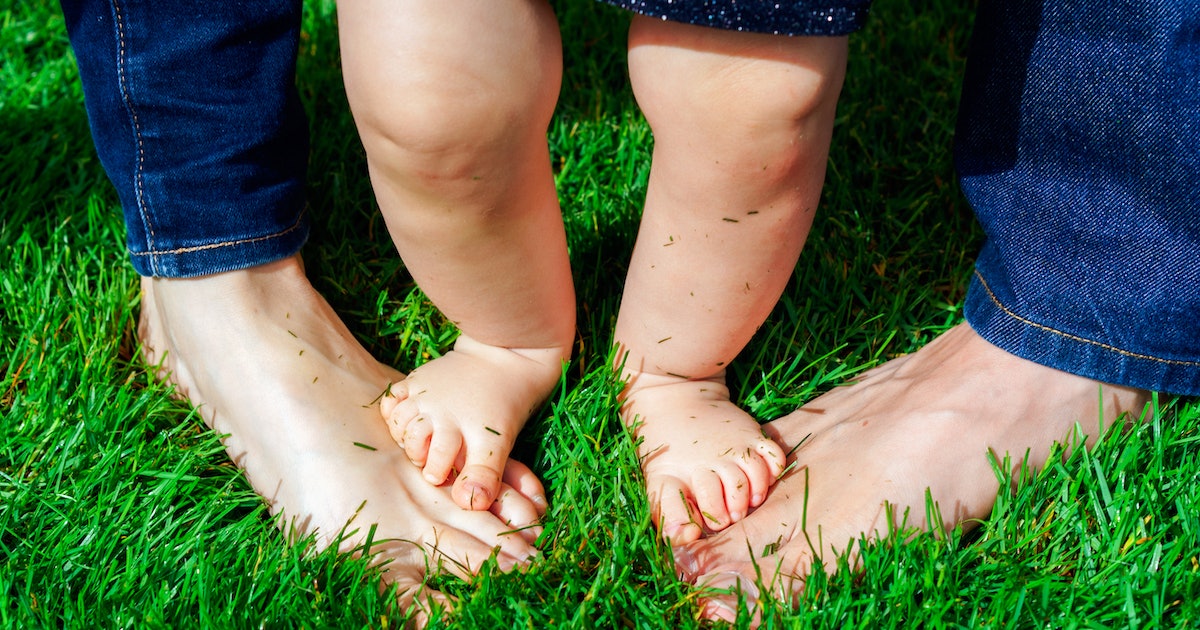
When you are making your baby familiarised with the grass environment, ensure that you have pruned the grasses, pulled out the toxic plants, and filtered out the weeds and insects from it – making it completely baby-proof. Only when that is done may you kick start this acclimatization process.
Step 2 – Spread a mat on the grass
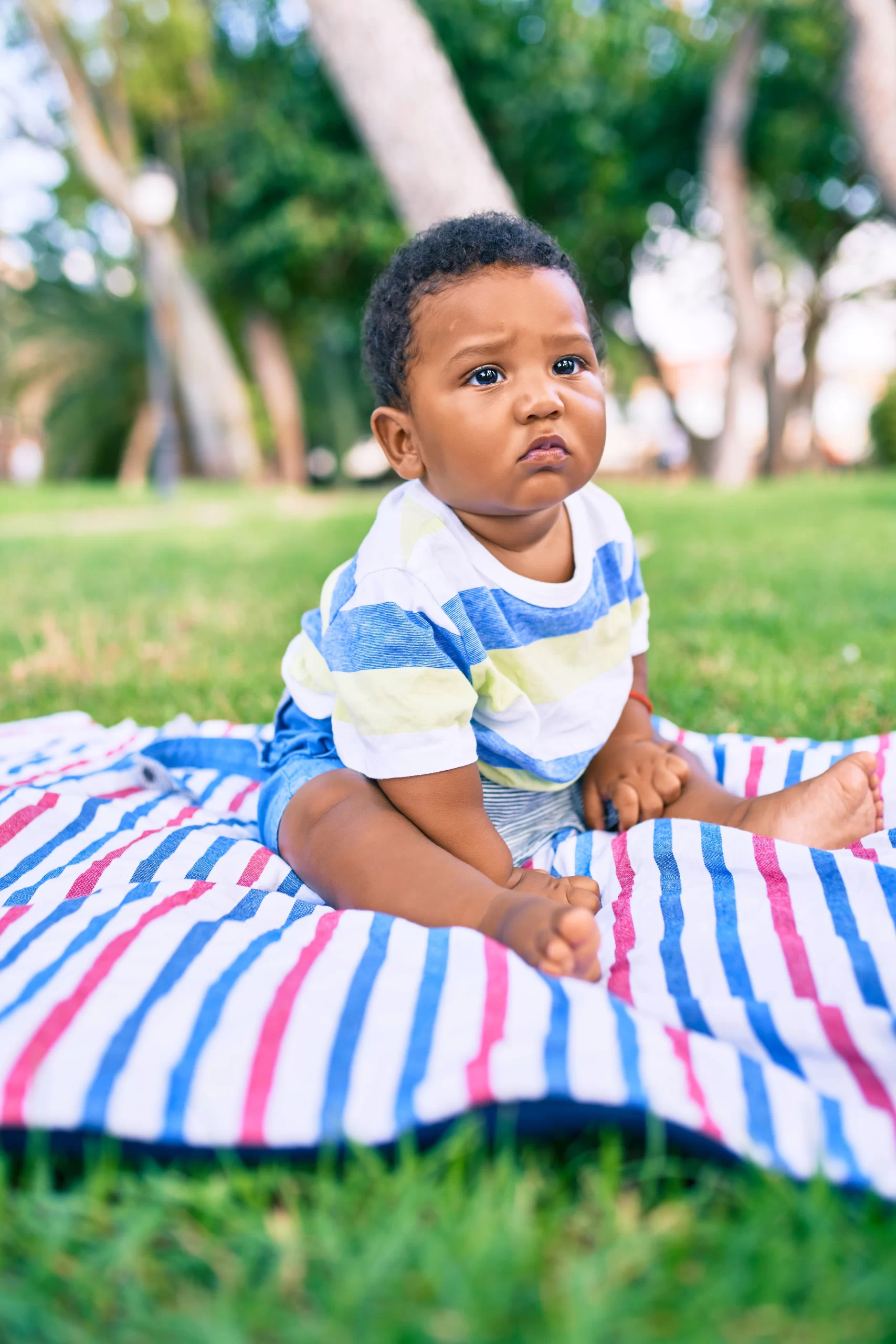
To encourage them to walk on the grass and accept the same – you need to start with a familiar domain. Spread a mat or a cloth piece on the grass, and as they sit down there, then little by little, encourage them to explore the grass around them.
Step 3 – Keep all the toys around
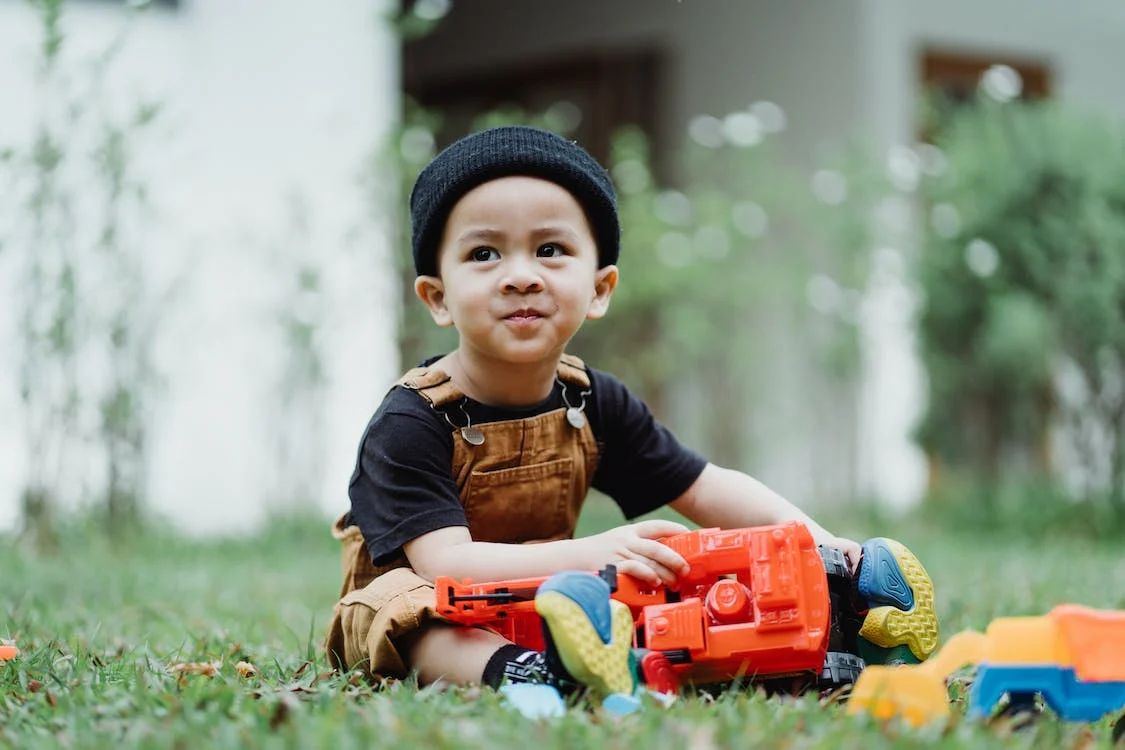
You already know why do babies avoid grass is because they are acting as per their natural defense. So, when you spread their toys all over, that whole area seems very attractive to them, and they psychologically put their fears at the backside, thereby accepting the environment.
Step 4 – Try to make the baby move
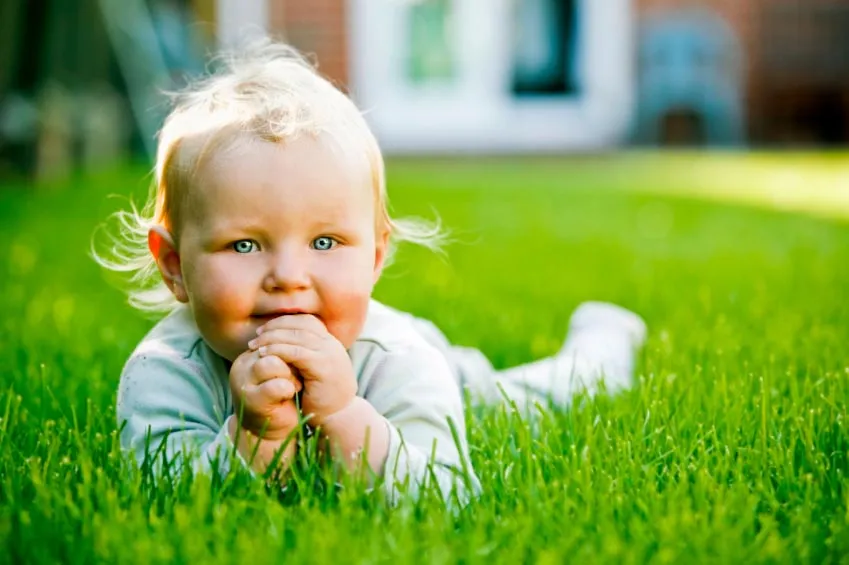
Once they have socialized well with the grasses, try to help them navigate through the same. Walk with them and guide them as they crawl through the grassy surface.
What if the baby gets a grass allergy?
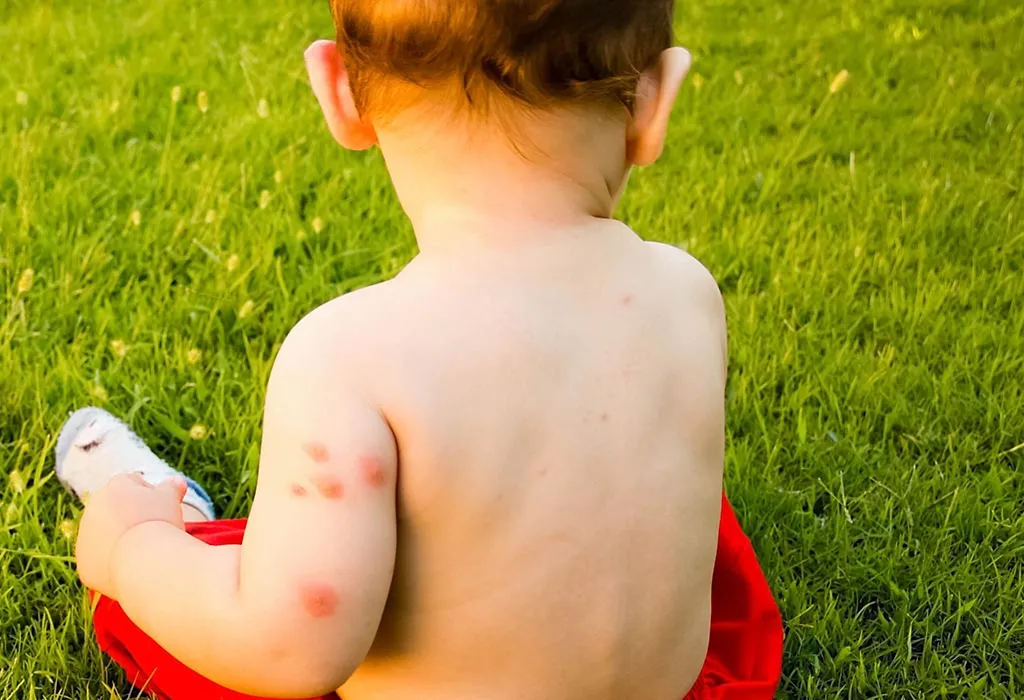
If your kid has just learned how to prowl on the grassy field and seems to enjoy their day out, then there’s a chance that they may get a grass allergy. If you see your child developing rashes, sneezing, and having watery eyes, chances are that – the little one has developed a grass rash or is allergic to grass. In that case, before you see the doctor, you have to –
- Wash that affected area with a mild anti-bacterial lotion and warm water to soothe the skin. Apply chemical-free moisturizer over it.
- If the concerned area is itching or burning, you can also apply a cold compress.
- Calamine lotions always help. You may apply some copiously on the affected area.
Once you are done with basic first-aid and if the conditions still persist, it is best to consult a medical practitioner. In the future, ensure that your child washes their hands and other exposed parts of the body after a day out in the grass. Also, in case you find out that your little one is allergic to grass, ensure that they wear long pants and socks while going out to play. In general, keep their skin moisturized.
Be cautious of these factors
If you have been reading this article through, you already have got a fair idea about why do babies avoid grass and what steps you may take to familiarise the baby with the grass environment. You also have a to-do list ready in case your little one suddenly develops a grass allergy. But, before you switch tabs, here are some quick factors that you must note –
- There are times when the concept of sensory overload may go beyond the normal. In those cases, the child may be affected (1 amongst 6 babies face it) and become hypersensitive about their surroundings. This would include basic stimulants like odor, touch, sounds, and visual details. If you find that your child, even after a reasonable period, cannot process these basic senses well, it is time for you to seek medical advice.
- The concept of ancestrally recurrent danger is inbuilt in every child. So, any kind of aversion and the natural reaction to it is an intuitive reaction of the child. It is often termed an evolutionary circumstance. But ensure that it does not exceed a certain limit since that would require medical help.
- There are multiple videos on social media showing the happiness of the kids when left to play on the grass. However, most of these videos are doctored and have no authenticity. Therefore you need to steer clear of these gimmicks and allow your child to familiarise himself with the grass before taking him or her out to play in the garden.
Final note
Amongst all the weird learnings that you will get as a parent, the reason why do babies avoid grass will truly baffle you. After all, you expected your little one to enjoy its outing under the sun, on the grass – but it seems like its sensitive nature was quite against it. Hence, you must be cautious of the same. As long as it’s a normal scenario, there’s nothing much to worry. But if your child is taking too much time to settle, you do need to seek medical help to prevent future issues. Did you find this article helpful? Then, please share it with your parent-friends and keep following this page for more exciting content like this.

